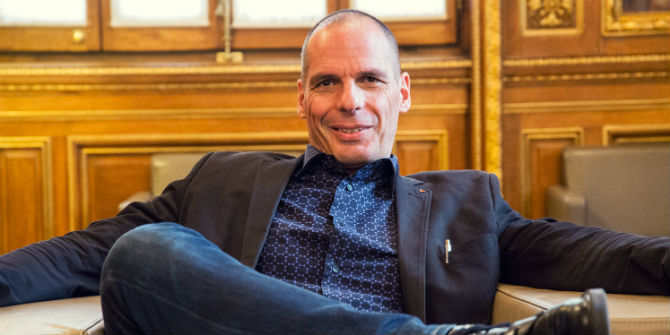 In the first of a series for LSE BrexitVote, Alan Sked – who founded Ukip in 1993 (but has since distanced himself from the party) – examines the EU’s structures and purpose, and looks for clues in a pamphlet published by the Union. He argues that its aim is political and not merely economic union, and recalls the experience of Yanis Varoufakis during the Greek bailout negotiations and what it reveals about the ‘democratic deficit’ that afflicts the relationship between the ‘troika’ and the rest of the EU.
In the first of a series for LSE BrexitVote, Alan Sked – who founded Ukip in 1993 (but has since distanced himself from the party) – examines the EU’s structures and purpose, and looks for clues in a pamphlet published by the Union. He argues that its aim is political and not merely economic union, and recalls the experience of Yanis Varoufakis during the Greek bailout negotiations and what it reveals about the ‘democratic deficit’ that afflicts the relationship between the ‘troika’ and the rest of the EU.
What exactly is the European Union? It is not an easy organisation to describe. Its hybrid constitution includes among other bodies a decision-making European Council (summit meetings of the heads of government of the 28 member states), a powerful bureaucracy run by the European Commission with 30-odd departments (directorates-general), a Parliament that discusses Commission proposals, and a Supreme Court (the European Court of Justice) to rule on disputes.
The Commission has its own President, as does the Council. One Commissioner heads the new EU Foreign Service and there is also a separate organisation – the Eurozone – for the 19 member states which employ the would-be “single currency” of the EU, the euro. Nine member states, including Britain, use their own currencies.

The governance of the Eurozone does not relate intelligibly to the other institutions previously described. Indeed, in the recent crisis over Greek debt, its governance seems to have been given over to a hybrid body known as the ‘troika’ representing the European Commission, the European Central Bank and the International Monetary Fund. This has no constitutional basis in European law.
Another body supervising the negotiations with Greece has been the ‘Eurogroup’, which also has its own President. It is supposed to be composed of the finance ministers of all Eurozone member states but when the Greek finance minister in 2015 at a crucial point in the negotiations over Greece’s debt objected to being excluded from the Eurogroup and asked for legal justification for this, he was told: ‘Well, the Eurogroup does not exist in law. There is no treaty which has convened this group.’ Yanis Varoufakis, the Greek minister concerned, later commented in an interview in the New Statesman:
‘So what we have is a non-existent group that has the greatest power to determine the lives of Europeans. It’s not answerable to anyone, given that it does not exist in law, no minutes are kept; and it’s confidential…so no citizen ever knows what is said within…These are decisions of almost life and death, and no member has to answer to anybody.’
This is true of much of EU governance (the Council operates in secret, as do Commission committees) and is part of the EU’s notorious ‘democratic deficit’. Yet the lament of Jykri Katainen, the Finnish Vice-President of the European Commission in charge of jobs, growth, investment and competitiveness, that ‘we don’t change our policy according to elections’ was widely quoted during the Greek crisis—as if anyone had ever suggested otherwise. Meanwhile, another problem for Varoufakis during the crisis was that (according to the President of France in particular) no country is allowed to abandon the euro. Membership of the Eurozone is irreversible. Hence, for making contingency plans for Greece to return to the drachma, Varoufakis was at one point considered liable to be charged with high treason!

What then is the purpose of the EU? What is the aim of the continuing waves of European integration, the succession of treaties concluded by member states and the goal of ‘ever-closer union’ laid down in the founding treaty of the EU, the Treaty of Rome?
One way of finding out is to consult a document from the Official Publications of the European Union, whose English-language title is European Unification: The Origins and Growth of the European Community. Several editions are available in different languages but I will now quote from the third edition of 1989 which appears to be a translation from the German by a Klaus-Dieter Borchardt. The section headed ‘Political Integration’ opens as follows:
‘Although the principles and measures laid down in the Treaties relate only to the establishment and operation of the common market, economic integration is not meant to be an end in itself but merely an intermediate stage on the road to political integration.’ [author’s emphasis]
It is imperative for British voters to bear this in mind when the Remain camp talks exclusively about economic statistics or the Single Market. The ultimate aim of the EU according to its own official publication is political NOT economic integration. The document then quite rightly explains that political integration can come about by either ‘confederalist’ or ‘federalist’ methods. The confederalist one is then rather dismissed in the sentence: ‘This is the principle underlying the work of the Council of Europe and the OECD’—obviously inadequately European institutions, since they preserve the autonomy of member states. The document instead reserves its enthusiasm for the federalist approach:
‘The federalist approach, on the other hand, aims to dissolve the traditional distinctions between Nation States. The outdated notion of inviolable and indivisible national sovereignty gives way to the view that the imperfections of social and international co-existence, the specific shortcomings of the nation State system and the dangers of the predominance of one State over others (so frequent a phenomenon in European history) can only be overcome by individual States pooling their sovereignty under a supranational community. The result is a European federation in which the common destiny of its peoples—still retaining their individual identities—is guided, and their future assured by common (federal) authorities.
‘The European Community is a product of this federalist approach, though in a somewhat modified form owing to the Member States’ reluctance simply to abandon altogether their sovereignty and the old nation State structure which they had only just regained and consolidated after the Second World War in favour of a European federation. Once again a compromise had to be found which, without necessarily establishing a federal structure, would provide more than mere cooperation along confederal lines. The solution, both brilliant and simple, was to seek to bridge the gap between national autonomy and European federation in a gradual process. Rather than relinquish all sovereignty overnight, the Member States were asked merely to abandon the dogma of indivisibility.’
This seems a perfectly acceptable description of the process of ‘ever-closer union’ at work before 1989. The political independence of member states (‘all sovereignty’) is to disappear completely, but gradually, not ‘overnight’.
There are three points to note regarding the pamphlet. First, since 1989, thanks to a number of further treaties, the EU has made substantial progress towards becoming a completely federal state. It has acquired a foreign service, an intelligence service, a police service, EU arrest warrants, a single legal personality and the absorption of the European Council into the treaty structure making that body accountable to the European Court.
It even asks members to give forewarning of any desire to secede from the Union so as to precipitate negotiations. In short (through the Lisbon Treaty which came into force in 2009) it now has its own constitution. Ironically, its desire seems to be to become just a large nation state like its perceived international rivals Russia, China and the United States. It has its own passport, anthem, flag, parliament, constitution, currency, police force, diplomatic service, supreme court, civil service, intelligence service, laws and policies. All it lacks to be a fully modern state is an elected government, armed forces and a single tax system. One should add, of course, democratic accountability and legitimacy.
Read on: Alan Sked on the EU, part two: propaganda and pacifism from a toothless entity
Alan Sked on the EU, part three: how Germany came to dominate the EU
This is the first of a series of posts by Alan Sked about the EU. It represents the views of the author and not those of the BrexitVote blog, nor the LSE.
Alan Sked is Professor Emeritus of International History at the LSE.







– a united states of europe run by the germans..
-what could possibly go wrong?